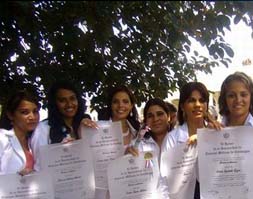The development of professional skills of the recent graduates of medical sciences
Keywords:
MEDICAL EDUCATION, PROFESSIONAL EDUCATION, CONTINUING EDUCATION.Abstract
Introduction: the professionalization of the recent graduate is one of the priorities, given the need of improving the ways of performance for competent professional graduates.
Objective: describe the ways for a competent performance of the new professionals of Medical Sciences.
Method: the dialectical materialist method was used, which allowed to analyze the contradictions in the process of professionalization of the recent graduates, aimed at determining the relationships and dependencies between the elements involved in this process in the field of research, and the trends of the development, through a documentary review, and surveys applied to the new physicians, as well as interviews with employers.
Development: the professionalization of the medical graduates is conditioned by the quality, integrality and pertinence during the continuous training, a stage that is marked by decisive guidelines to form an attitude before the profession and to develop the bases of his or her performance, where the first stage of the permanent training will coincide with the goal of the advanced education: "to achieve a professional who transmits and transforms the society with efficiency and quality, feeling fully satisfied with the individual emotional, moral and spiritual state."
Conclusions: the process of professionalization of the new graduate of the medical sciences is a necessity for the professional training. This process must be consolidated based on the development of competent professional activities, which means to recognize the work towards the appropriation of methods of performance as a main axis in the training process.
Downloads
References
1. Salas Perea RS, Díaz Hernández L, Pérez Hoz G. Identificación y diseño de las competencias laborales en el Sistema Nacional de Salud. Educ Med Super [Internet]. 2013 Mar[Citado 2017 jul 03]; 27(1): [Aprox.10.p]. Disponible en: http://scielo.sld.cu/scielo.php?script=sci_arttext&pid=S0864-21412013000100012&lng=es
2. Salas Perea RS, Díaz Hernández L, Pérez Hoz G. Normalización de las competencias laborales de las especialidades médicas en el Sistema Nacional de Salud. Educación Médica Superior[internet]. 2013[citado 2017 jul 03]; 27(2): [Aprox. 6p.]. Disponible en: http://ems.sld.cu/index.php/ems/article/view/174/99
3. Fernández Sacasas, JA. El principio rector de la Educación Médica cubana. Un reconocimiento a la doctrina pedagógica planteada por el profesor Fidel Ilizástigui Dupuy.Edu Med Super[internet]2013. [citado 2014 sep 09]; 27 (2). Disponible en: http://www.ems.sld.cu/index.php/ems/article/view/170/94
4. Cherjovsky R. Las competencias como núcleo del diseño curricular. Rev Argentina Educ Med[internet]. 2008[citado 2017 jul 03]; 2(1):[Aprox.2p]. Disponible en: http://www.raemonline.com.ar/pdf_pub/n1_08/v2n1_1_2.pdf
5. Vicente Odio EF. Consideraciones de la enseñanza del método clínico en la formación médica superior. Educación Médica Superior [Internet]. 2015[citado 2015 may 10];29(10). Disponible en:http://www.ems.sld.cu/index.php/ems/article/view/287/238
6.Villa Real-Valera JA.La cultura de la salud en el contexto comunitario: una mirada desde la sociología cultural. Revista Granma Ciencia [internet] 2012 [citado 2017 jul 03]; 16(2). Disponible en: http://www.grciencia.granma.inf.cu/vol%2016/2/2012_16_n2.a11.pdf
7. Najmanovich D. Pasos a un pensamiento complejo en salud [internet]2013. [citado 2013 ago 12];13(21):[Aprox.10p.]. Disponible en: http://www.google.com.cu/url?sa=t&rct=j&q=&esrc=s&source=web&cd=1&cad=rja&uact=8&ved=0ahUKEwjIv4TCi8rSAhUp0YMKHVBWAHsQFggYMAA&url=http%3A%2F%2Fwww.denisenajmanovich.com.ar%2Fupload%2FPasos%2520hacia%2520un%2520pensamiento%2520complejo%2520en%2520salud.doc&usg=AFQjCNGg0a2EVTiEBUZEXBsu7zsj4lmASQ&bvm=bv.149093890,d.amc
8. Tecnológico de Monterrey en Nuevo León, México: Especialidad de Pediatría;2015 [Citado 2015 ju 24]. Disponible en: http://www.itesm.mx/wps/wcm/connect/itesm/tecnologico+de+monterrey/maestrias+y+doctorados/escuelas/escuela+de+medicina/especialidad+en+pediatria/monterrey+ren
9. Ponce M, Fonseca Hernández M. La toma de decisiones médicas como la habilidad profesional esencial en la carrera de Medicina Medisur[internet]. 2010 [citado 2017 jul 03]; 8(1): [Aprox. P.]. Disponible en: http://scielo.sld.cu/scielo.php?script=sci_arttext&pid=S1727-897X2010000100009
10. Lima Rodríguez JS, Lima Serrano M, Ponce González JM, Guerra Martín MD. Diseño y validación de contenido de rúbricas para evaluar las competencias prácticas en estudiantes de Enfermería. Educación Médica Superior [Internet]. 2014 [citado 2015 may 10];29(1):[Aprox.3p]. Disponible en:http://www.ems.sld.cu/index.php/ems/article/view/368/233
11. Blanco Aspiazu M, Hernández Azcuy O, Llibre Guerra J, Viera Machado C, Cruillas Miranda S, Méndez-Rosabal. A. Propuesta de los criterios generales de valoración en preguntas de desarrollo para los residentes de Medicina Interna de la Facultad de Ciencias Médicas "Finlay-Albarrán". Revista Habanera de Ciencias Médicas [Internet]. 2015 [citado 2015 may 10]; 14(2). Disponible en: http://www.revhabanera.sld.cu/index.php/rhab/article/view/846/739
12. Romero Fernández B, Garriga Alfonso NE, Martínez Pichardo RR. Sistema de actividades metodológicas con enfoque de competencia didáctica para profesores de Farmacología I, de la carrera de Medicina. Matanzas. Rev Méd Electrón [internet]. 2011[citado 2013 dic 28]; 33(3):[Aprox.8p.] Disponible en: http://scielo.sld.cu/scielo.php?script=sci_arttext&pid=S1684-18242011000300009
13. Unesco. Comunicado de la Conferencia Mundial sobre la Educación Superior: La nueva dinámica de la educación superior y la investigación para el cambio social y el desarrollo [Internet]. Julio 5-8 París: Unesco; 2009 Disponible en: http://www.unesco.org/education/WCHE2009/comunicado_es.pdf
14. Guía de apoyo para la redacción, puesta en práctica y evaluación de los resultados del aprendizaje.Agencia Nacional de la Evaluación de la Calidad y Acreditación.[Internet] 2011. Madrid: Cyan, Proyectos Editoriales, S.A. Disponible en:http://portal.uned.es/pls/portal/docs/PAGE/UNED_MAIN/LAUNIVERSIDAD/VICERRECTORADOS/CALIDAD_E_INTERNACIONALIZACION/INNOVACION_DOCENTE/IUED/MATERIALES%20DIDACTICOS/WEB_MADI_MANUAL_DOCENTIA_UNED_APROBADO_ANECA_09_04_20_0.PDF
15. Morales Martínez CI, Nadchar Rodríguez O, Santander Montes AJ. Principales dificultades en el desarrollo de habilidades investigativas en los estudiantes de Medicina. III Jornada de Educación Médica [Internet]. 2013 [citado 2013 jul 25]. Disponible en: http://edumedhabana2013.sld.cu/index.php/edumedhabana/2013/paper/view/80/147

Published
How to Cite
Issue
Section
License
Authors who have publications with this journal agree to the following terms: Authors will retain their copyrights and grant the journal the right of first publication of their work, which will be publication of their work, which will be simultaneously subject to the Creative Commons Attribution License (CC-BY-NC 4.0) that allows third parties to share the work as long as its author and first publication in this journal are indicated.
Authors may adopt other non-exclusive license agreements for distribution of the published version of the work (e.g.: deposit it in an institutional telematic archive or publish it in a volume). Likewise, and according to the recommendations of the Medical Sciences Editorial (ECIMED), authors must declare in each article their contribution according to the CRediT taxonomy (contributor roles). This taxonomy includes 14 roles, which can be used to represent the tasks typically performed by contributors in scientific academic production. It should be consulted in monograph) whenever initial publication in this journal is indicated. Authors are allowed and encouraged to disseminate their work through the Internet (e.g., in institutional telematic archives or on their web page) before and during the submission process, which may produce interesting exchanges and increase citations of the published work. (See The effect of open access). https://casrai.org/credit/


